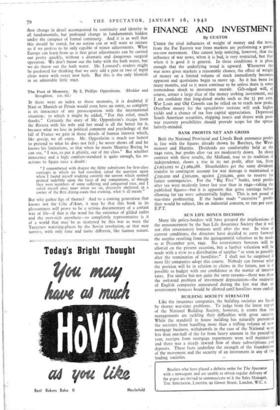FINANCE AND INVESTMENT
By CUSTOS
UNDER the rival influences of weight of money and the news from the Far Eastern war front markets are performing a gentle see-saw movement. One cannot help noticing, however, that the influence of war news, when it is bad, is very restricted, but that when it is good it is general. In these conditions it is plain enough that the underlying trend is upward. Whenever the war news gives markets a reasonable chance, the effect of weight of money on a limited volume of stock immediately becomes apparent and quotations begin to move up. So it has been for many months, and so it must continue to be unless there is some tremendous shock to investment morale. Gilt-edged will, of course, attract a large slice of the money seeking investment, and I am confident that long-dated stocks such as the 3f per cent. War Loan and Old Consols can be relied on to reach new peaks. Overflow money for the speculative sections will seek higher yields and a chance of tax free capital appreciation. Depressed South American securities, shipping issues and shares with post- war recovery possibilities should provide scope for the specu- latively-minded.
BANK PROFITS NET AND GROSS
Both the National Provincial and Lloyds Bank announce profits in line with the figures already shown by Barclays, the West- minster and Martins. Dividends are comfortably held at the 1940 rates, but profits after lax are moderately down. In sharp contrast with these results, the Midland, true to its tradition of independence, shows a rise in its net profit, after tax, from Dt,933,093 to £1,969,288. Shareholders get the same dividend, transfer to contingent account for war damage is maintained at L250,000 and L5400,000, against £250,000, goes to reserve for future contingencies. For the "Big Five" banks, total profits after tax were modestly lower last year than in 1940—taking the published figures—but it is apparent that gross earnings before allowing for tax were substantially higher. This is not proof of war-time profiteering. If the banks made " excessive " profits they would be subject, like an industrial concern, to zoo per cent. E.P.T.
SUN LIFE BONUS DECISION
Many life policy-holders will have grasped the implications of the announcement by the Sun Life Assurance Society that it will not allot reversionary bonuses until after the war. In view of current conditions, the directors have decided to carry forward the surplus resulting from the quinquennial valuation to be made as at December 31st, 1941. No reversionary bonuses will be allotted on the present occasion, but a further valuation will be made with a view to a distribution of surplus "as soon as possible after the termination of hostilities." I shall not be surprised if most life companies adopt this course. Nobody can foresee what
the position will be in relation to claims in the future, nor is it possible to budget with any confidence in the matter of interest
rates. For similar but not quite the same reasons—there was then the awkward problem of investment depreciation—the majority of English companies announced during the last war that no reversionary bonuses tvould be allotted until hostilites were ended.
BUILDING SOCIETY STRENGTH
Like the insurance companies, the building societies are faced by thorny war-time problems. To judge from the latest report of the National Building Society, however, it seems that the managements are tackling their difficulties with great success. While the standstill in house building has naturally prevented the societies from handling more than a trifling volume of new mortgage business, withdrawals in the case of the National were less than one-half of the far from heavy amount in the preceding year, receipts from mortgage repayments were well maintained and there was a steady inward flow of share subscriptions and deposits. These facts underline the strength of the foundations of the movement and the security of an investment in any of the leading societies.


























 Previous page
Previous page